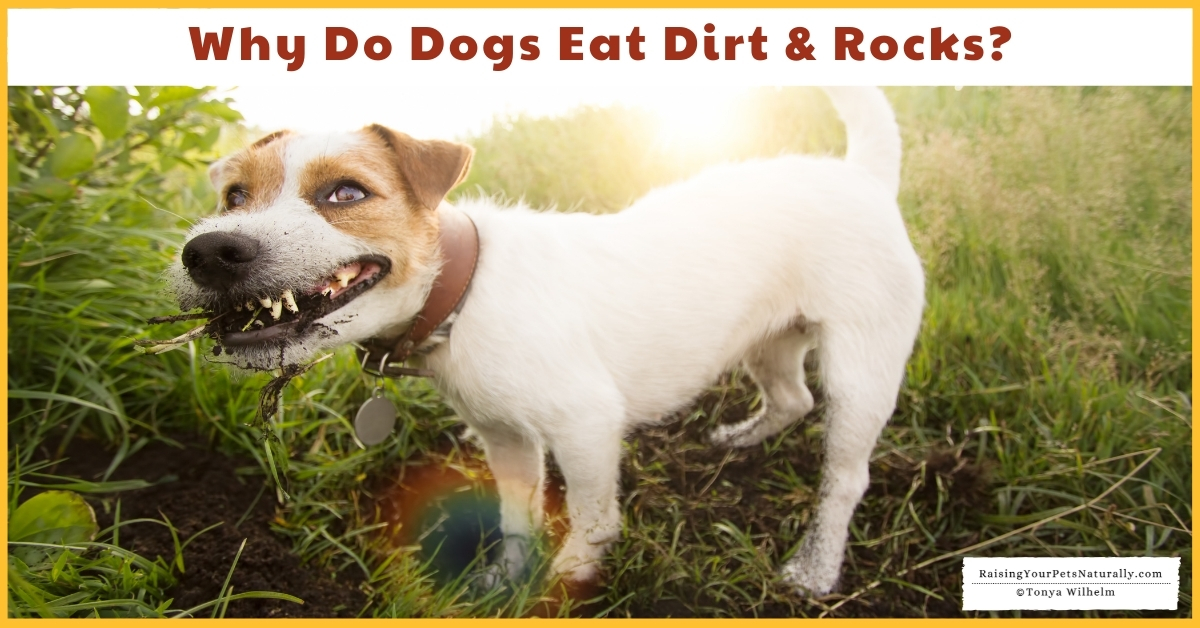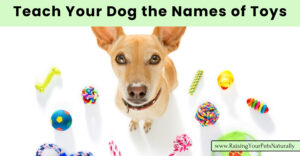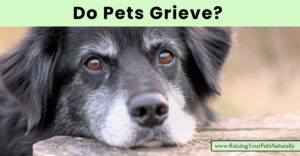Google Adsense—>

Why Do Dogs Eat Dirt and Rocks?

As a dedicated dog parent, you should be concerned if your dog or puppy eats dirt or rocks. This can be a very dangerous behavior. Eating excessive dirt or just one rock has the potential to cause intestinal blockage or choking. Choking will be obvious, but intestinal blockage may happen without you even knowing it until it’s too late. Not to mention all the chemicals and waste found in today’s dirt.
When a dog eats dirt or rocks, it is called pica. Pica is a term used when a species consumes a non-food item. Common non-food items a dog may eat are feces, grass, paper, dirt, and rocks. In today’s blog, I will chat with a few leading veterinarians and other dog experts regarding dogs and puppies eating dirt and rocks.
Puppy or Dog Eating Dirt or Rocks Due to Behavior
As a professional dog trainer, a dog’s behavior is always on my radar. Bored or unsupervised dogs often will find ways to entertain themselves. Eating non-food items is one way a dog might release some energy and have a little self-serving entertainment.
In a puppy’s mind, a rock is fun to toss around, push with his nose, and eventually eat. Dirt. You bet. What may have started with some digging fun may quickly lead to a great find of just a tiny little food morsel. The next thing you know, your cute little puppy is eating dirt and mud.
Stress can also lead to a dog eating non-food items. I remember my golden retriever, Theo would eat blankets or other soft items during thunderstorms. When Dexter was a puppy, he would nibble on whatever was in front of him when he was worried that our cat was going to pounce on him.
Medical Reasons a Dog May Eat Dirt or Rocks
Mineral Deficiency: Carol Osborne, DVM, an integrative veterinarian at Chagrin Falls Pet Clinic suggests a bad diet may be the cause of dirt or rock eating. “Your dog may eat dirt as a sign that they are suffering from a mineral deficiency. Dogs have a natural instinct to adjust their diet when they are not getting the nutrients they crave. If your dog is eating dirt for more than a few days, the first step is to check the food label for proper, balanced nutrition, including essential minerals.”
If your dog’s fresh food meets or exceeds his needs, sometimes his body isn’t absorbing the nutrients. Dr. Osborn states, “Sometimes a lack of essential minerals is due to a medical absorption issue in the stomach or intestines, despite having a decent diet.”
Michelle Burch, DVM from Safe Hounds Pet Insurance goes on to say, “Iron deficiencies will also lead to dogs eating dirt and rocks as they look for an iron source. Dogs will develop iron deficiency from chronic blood loss, poor diets, or severe hookworm infections.”
Neurological Conditions: When it comes to neurological conditions, my ears are always wide open. I feel that a lot of behaviors and health issues are related to undiagnosed neurological issues. Maybe I’m just sensitive because I feel my golden had something not quite right with his brain and now Dexter has a medical condition affecting his brain function.
Georgina Ushi Phillips, DVM from Not a Bully relayed that, “Certain neurological diseases have been linked to pica in dogs. These could be things like compulsive behaviors or a result of a brain tumor that’s rewired your pup’s brain into thinking rocks and dirt are food.”
Dr. Phillips went on to say that, “Certain medications can cause dogs to eat rocks and dirt, which is quite the side effect. The most common drug that can cause pica is prednisone, which helps treat dozens of conditions. Phenobarbital and other anti-seizure drugs have also been known to cause pica.”
I found that very interesting, especially since some of those medications are used to help treat some symptoms of the brain.
Chronic Gastritis or Gastric Upset
Dr. Burch informs us that, “Gastritis is inflammation of the stomach, while gastroenteritis is inflammation of the stomach and intestines. Diseases such as exocrine pancreatic insufficiency, severe inflammatory bowel disease, and intestinal lymphoma can cause chronic inflammation. These diseases then result in decreased nutrient absorption. Thus I will see dogs search for a source of nutrients their body craves.”
Dr. Osborne, suggests a dog may eat dirt to soothe his belly. “Your dog may eat dirt to dilute toxic or harmful foods and reduce their impact on the gut. Make sure your dog has not eaten any human foods, like chocolate and grapes, that are known to cause gastric upset. Certain plants and grass can also cause an upset stomach and cause your dog to eat dirt to calm their system. Pay attention to your dog’s eating habits to find the root cause of the issue.”
Liver Disease
When I spoke with Dr. Burch, she explained how liver disease in dogs may be the culprit of dirt eating. “The most common liver disease which leads to eating dirt and rocks is hepatic microvascular dysplasia, or a type of liver shunt. This type of liver shunt occurs with underdeveloped or absent blood vessels in the liver. Due to the decreased blood flow to the liver tissue, the organ will decrease in size and decrease filtering toxins and creating proteins for growth and development. With the progression of the disease, dogs will develop pica or the eating of dirt and rocks. Additional symptoms can include vomiting, diarrhea, and failure to thrive.”
What to Do When Your Dog or Puppy Eats Dirt or Rocks
Tackle the issue head-on. These are just some of the reasons a dog or puppy may eat dirt or rocks. There are actually more.
I’ve said it numerous times in the past: please do not leave your dog unsupervised in his yard. This is just one of many things that could go wrong in a blink of an eye. Spending quality time with your dog on a daily basis and actively supervising him can help reduce the risk of your dog or puppy eating dirt or rocks out of boredom.
Addressing your dog’s nutritional needs and health will help his holistic veterinarian ensure he is healthy and not eating objects from lack of nutrition or an underlying health issue. Even if that means you need to get a second or third opinion to find a diagnosis, your dog is counting on you to be his best advocate. After all, he only has you in his corner.
Your questions or comments are welcome below.
Are you looking for even more ways to stay up to date with Raising Your Pets Naturally? Sign up for the newsletter for more tips and promotions. Don’t forget to be social and Like, Follow and Subscribe. Comments below are always welcome.
Facebook Twitter Pinterest Instagram YouTube
 |

If you found my blog helpful, please consider a small contribution. Dexter and I thank you! |
Google Adsense—>




